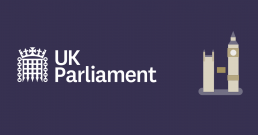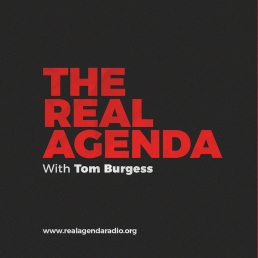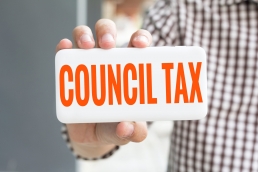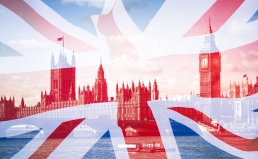Kevin Hollinrake MP | I'm launching the Property Research Group of MPs to fight for reform of outdated property taxes
The article by Kevin Hollinrake, MP for Thirsk and Malton, first appeared in the Daily Telegraph on 11/12/2020. For the original article, please click here.
The current system is quite simply not fit for purpose. Take council tax. Every household in England – renters and owners alike – pays this annual fee to help fund important local services, from rubbish collection to maintaining parks and public libraries. No-one disputes the purpose of the tax. Yet, according to new polling out today, council tax is the most unpopular tax in the country.
This is largely because the amount of council tax households pay does not in any way reflect the current price of their home. The tax is calculated on a system set up in 1991, nearly 30 years ago. This outdated tax therefore has a disproportionately higher impact on younger and poorer people who tend to live in low value homes. A person living in a property worth £100,000 may pay six times as much tax, as a proportion of their home’s value, compared to someone living in a £1 million property.
Many low-income households who cannot afford to pay are aggressively pursued by local council and debt collection agencies. According to Citizens Advice, 40 per cent of problem debt can be apportioned to council tax. Covid-19 has only made the problem worse with an extra £700 million in council tax debt accrued by 800,000 struggling households since March. The inability of people to pay council tax is contributing to the perilous state of local government finances. According to statistics published by the Ministry for Housing, Communities and Local Government, households in England collectively owed more than £3.5 billion in council tax. Over the past five years there has been over a 30 per cent increase in overall council tax debt.
Stamp duty is another property tax which is an attack on aspiration and ownership. By taxing property transactions, stamp duty discourages homeowners from moving – be it an older couple downsizing or a growing family upsizing – that would lead to more efficient use of the country’s housing stock. Figures published earlier this year by the campaign group, Homes for Later Living, show that over 3 million people over 65 would like to move home but don’t feel they are able to. The fall in transactions ultimately results in fewer new homes being built because market signals, to which housebuilders respond, are distorted.
My friend, the Chancellor, has implicitly acknowledged the economic harm inflicted by stamp duty by cutting the tax where it is seen to be most burdensome. In addition to the tax-free threshold for first-time buyers, in response to the downturn caused by the pandemic Rishi Sunak announced the exemption from stamp duty of all residential property transactions worth up to £500,000 until April 2021. Given the ongoing impact of Covid-19 on the economy and the long recovery that is likely to follow, returning stamp duty to its pre-crisis levels next April would be an unnecessary and unaffordable act of political and economic self-harm.
Business rates is yet another property tax which hampers investment. It is one of the biggest contributors to the death of high streets up and down the UK. And it has an impact on some of those places most in need of levelling up. Seventy-five per cent of constituencies with the highest rates burden are located in the North and the Midlands. This is because the tax rate does not mirror economic performance, so for areas facing economic challenges the burden is much higher. The Government has recognised this and taken bold action by publishing a fundamental review of business rates and providing a business rates holiday for retail, hospitality and leisure during the Covid pandemic. This has been welcome but long-term and sustainable reform is vital.
Council tax, stamp duty and business rates are just three examples of an out-of-date system which is in desperate need of reform. This is why I am forming the Property Research Group. Together with colleagues from right across the country, we will be putting forward proposals to design a fairer and more efficient property tax system that works for all.
Kevin Hollinrake MP is Chair of the Property Research Group.
Supporter letter | There are systemic failings with Council Tax
One of our supporters, John, has shared his personal experience fighting against the unfair Council Tax system in Northumberland. He supports Fairer Share because he agrees that we need one simple, fairer tax system.
Dear Fairer Share,
My complaint is not just about the level of Council Tax bills, but also about the way councils arbitrarily make decisions and enforce them, employing automated processes that end up with debt collectors.
My first experience of Council Tax was when my late aunt—who was elderly and suffering from dementia—had her Council Tax discount benefit wrongly cut off.
Unfortunately, similar methods were also employed on me, despite being a pensioner on an income level that should qualify me for a Council Tax discount and housing benefits. I had helped my aunt buy her house on the basis that it would come to me after her death. When she died, it took us 7 months to sort out her affairs and carry out essential work to the house, so it could be brought up to the required standards and be lived in safely.
The council however, acted immediately to disqualify my Council Tax discount and housing benefits from the date the property title was passed to me. Its capital value was used to disqualify my entitlement even though it was a liability not an asset. The council made me pay the full Council Tax on the inherited house as well as the rented property I was previously staying in nearby. I was also made to repay “overpaid” housing benefits. The council and the Valuation Office both rejected my argument that paying two sets of Council Tax, plus paying back housing benefit constituted severe hardship.
My income as a single pensioner was reduced to far below the sum the government specified for pensioners to live on, ironically the same formula used to determine benefits in the first place. At the same time as they refused to alleviate the hardship they had caused, the council were giving out exemptions to private landlords for carrying out the same kind of essential repairs that I had to.
I was not only concerned about the money and hardship, but also the way the council behaved throughout.
I was pleased to come across your campaign as the current system needs to be simplified. I do wonder how many there are out there paying too much and not having fair assessments or appeals, especially with millions of homes going into debt since the start of the pandemic. There seems to be major systemic failures.
John L
Northumberland
Join John, sign and share our petition for a fairer system.
WATCH: Treasury Committee | Tax after Coronavirus
The House of Commons Treasury Committee held an oral evidence session on November 18th for its Tax after Coronavirus inquiry. Reforming Britain's property taxes was one point of discussion. Watch what Robert Palmer of Tax Justice UK and Arun Advani, Professor of Economics at the University of Warwick, had to say:
Robert Palmer (Tax Justice UK)
Arun Advani, Assistant Professor, Department of Economics, University of Warwick
We look forward to seeing the Treasury Committee's recommendations for dealing with Britain's property taxes after Coronavirus. The evidence heard in this session, in addition to the written evidence we submitted should emphasise how important reform could be.
Lockdown 2 | Replace Council Tax or watch debts spiral
We’re back in lockdown. Not the outcome that anyone was hoping for, but it is where we are and collectively, we have to make the best of it. Increases in Britain’s inequality and poverty levels have been sent into overdrive since the pandemic began, risking a national household debt crisis. Replacing Council Tax with a fair and equitable system must be high on the Government’s list of priorities over the winter…
Britain, we have a problem
Citizens Advice estimate that over 6 million homes have fallen into debt on at least one of their household bills since the outbreak of Covid-19. A whopping 2.8 million of these homes are in arrears on their Council Tax payments. Of those in debt, 18% have been unable to afford essential items such as food, 30% have run down their savings in order to make ends meet, and 22% are having to sell possessions.
Key workers are feeling the squeeze
It is especially concerning that 21% of key workers have fallen behind on their bills compared to 11% of the general population.
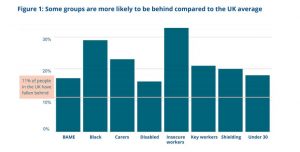 Source: Citizens Advice (2020)
Source: Citizens Advice (2020)
Of those who have seen a reduction in their income during the pandemic, almost half (46%) have then fallen into debt. If this trend continues through the winter, the damage felt won’t just be to households across the country. Local businesses, local authority finances and our communities themselves will also suffer.
A roadmap to recovery
Council Tax debt isn’t just a short-term problem. With monthly bills continually charged, even to those in debt, the question becomes: how do you get out of it? 40% of those who speak to Citizens Advice currently have a negative budget. This means that after their regular monthly living expenditures, they have nothing left over. The average negative budget is £133. Furthermore, the average monthly surplus was only £82. This is all that is left over for debt repayments each month.
For millions of households, the recovery from the financial shock of the first wave of Covid-19 will be a long one. It is estimated that if those in debt spent their entire disposable income solely on their debt repayments, it would take over two years to repay their “priority” debts - debts that carry the most serious consequences if left unpaid.
Lockdown 2: We can turn this around
The figures above are from the first national lockdown — March to May. Now that we find ourselves plunged into a second iteration of lockdown, these figures are likely to get a whole lot worse. Not only will millions more homes be plunged into Council Tax debt, but those already in arrears will see their debt mount even further. But it doesn’t have to be this way...
A fairer solution
At Fairer Share, our sole aim is to fix the UK’s unfair property tax system. This means replacing the broken Council Tax with what we are calling: The Proportional Property Tax - a flat rate of 0.48% charged on the value of a property.
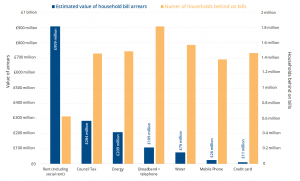
Of the major debts listed above, Council Tax is by far the simplest to reduce. Operated entirely by public institutions and with no private sector to consider, replacing Council Tax would be far easier than reducing rent or energy debts.
Not only does our proposal reduce tax bills for 18 million households, it also helps those most in need. Of the top 5 most income-deprived areas of the country, the average household saving under our plan ranges from £533 to £819 each year. This won’t suddenly fix the UK's household debt problem, but it will help to keep millions of families out of Council Tax debt and able to afford essential items such as food.
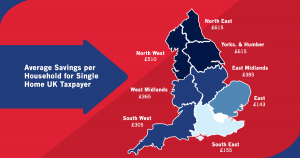
Furthermore, our proposal includes a deferral mechanism for those unable to pay. The 2.8 million households who have entered into Council Tax arrears since March won’t have to pay it back until they can afford it, or until the sale of their house.
Council Tax will no longer be a priority debt for those unable to pay. Not only will this greatly reduce the stresses of a potential bailiff visit, it allows households already in debt to start paying back their other important debts.
This deferral mechanism relies on removing 8 million renters from the property tax system. Renters have been one of the groups hardest hit by the pandemic, with many living paycheck-to-paycheck and over 320,000 are already in debt to their landlords. They need our support urgently.
We can help reduce the debt crisis, but we need your help!
You can support our campaign by joining the almost 70,000 households who have signed our petition for a fairer system.
You can also Email your MP to let them know why we need to replace Council Tax so urgently.
OECD report calls for a Proportional Property Tax in the UK
Earlier this month, The Organisation for Economic Co-operation (OECD) released its 2020 Economic Survey for the UK - a periodic review of the economies of its member states. The 2020 review covered areas ranging from productivity to trade, in addition to an impact assessment of Covid-19 and Brexit on the UK economy.
Encouragingly, the OECD also included a specific recommendation to reform Council Tax with a Proportional Property Tax - here is what they had to say:
"Council Tax could be increased to raise tax on high housing wealth. At the moment, the tax is charged at a much lower percentage of property value for high-value properties than for low-value properties. As recommended by the Mirrlees Review (2011), it would be simpler and more efficient to use a simple percentage of property value.
At the same time, this could be an opportunity to rebalance property taxes, moving away from stamp duties and transaction taxes. This would boost labour force mobility and encourage more efficient use of the housing stock. As Council Tax is local, resources could be used either to reduce the grant provided by the central Government to local authorities, or alternatively to finance services at the local level that have been cut recently."
The OECD joins an ever-growing list of organisations advocating for the UK to adopt a Proportional Property Tax, including the IFS, IEA, Adam Smith Institute, IPPR, and Resolution Foundation, many of whom signed our open letter to the Chancellor calling for reform to the UK's property taxes.
With the UK now firmly in recession and Coronavirus restrictions increasing, the case for a Proportional Property Tax has never been stronger. We hope the Government will listen to mounting calls for a new approach to property tax which is fair, simple and promotes aspiration.
You can read the full OECD report here.
You can read our Proportional Property Tax proposal here.
PODCAST | The Real Agenda: Lost Property (Tax) with Fairer Share's Andrew Dixon
Lost Property (Tax) with Andrew Dixon
Our founder, Andrew Dixon, joins Tom Burgess of the Coalition for Economic Justice, on his The Real Agenda podcast to discuss how The Proportional Property Tax would be fairer than the current system of Council Tax and Stamp Duty (listen below):
02:40 - Introduction
07:50 - What is the problem with our property taxes?
08:55 - What does Council Tax pay for?
09:40 - Why is Council Tax unfair?
10:50 - What is Fairer Share proposing?
11:20 - Who pays and why?
14:55 - Why not just change the Council Tax bands?
17:20 - How are we going to make this change?
18:50 - Why do we need to remove Stamp Duty?
21:00 - How can I join Fairer Share to make change happen?
Apple
https://podcasts.apple.com/gb/podcast/the-real-agenda/id1437103761.
Spotify
https://open.spotify.com/show/2AcLAWEad5Qak0ST6gUS4l
Amazon
https://music.amazon.co.uk/podcasts/9259fe21-5d3d-4c22-82b0-bac44316de3c/The-Real-Agenda-Network
Player FM
https://player.fm/series/2464307
https://podcasts.google.com/feed/aHR0cHM6Ly9yZWFsYWdlbmRhLmxpYnN5bi5jb20vcnNz
To sign our petition for a fairer system, please click here
12 things you didn’t know about Council Tax
We all pay Council Tax. But just how much do we really know about one of our largest monthly expenses? Let’s find out! We have compiled 12 things you might not know...
#1 - A house worth £100,000 pays 6 times more relative to its value than a £1 million property
This is like paying 6 times the VAT on a Ford Focus than on a Ferrari...
#2 - Some households would pay the FULL VALUE of their property in Council Tax payments in just 20 years
Have to read that twice? So did we! Certain properties in Easington Colliery, County Durham, pay up to 5% of their value each year in Council Tax. After just 20 years of Council Tax payments, these households will have spent the same amount on Council Tax as their house value!
In comparison, if you're lucky enough to own a £10 million property in Westminster, it would take 6,410 years of Council Tax payments to match your property value, and those living in more expensive homes it takes even longer! It’s just not right.
#3 - 3.5 million households are estimated to be in Council Tax arrears
Even before the pandemic, around 2.1 million households were in Council Tax debt. Between March and May, an estimated 1.3 million additional households had fallen behind on Council Tax, bringing the total to an outrageous 3.5 million British homes in Council Tax debt. This is not sustainable.
#4 - Houses on one side of the same road can pay £500 more than those on the other side
Our favourite fact. Nothing quite demonstrates how nonsensical Council Tax can be quite like a row of houses in Lambeth paying over £500 every year more than properties on the other side of the same street in Wandsworth. These properties really should be paying exactly the same or at least something similar. It’s just not fair.
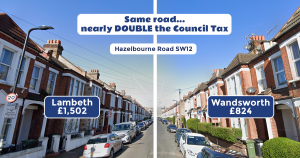
#5 - The richest are not always paying their fair share
We regularly see articles of billionaires moving their money to Monaco, Bermuda or the Cayman Islands to avoid paying income or corporation tax.
On top of this, tax bands do not reflect the value of mansions. As a result, we see £150 million properties in Kensington like this where the Council Tax is effectively capped under £2,474 per year.
We should all pay our fair share and property taxes should not be avoided by using clever loopholes.
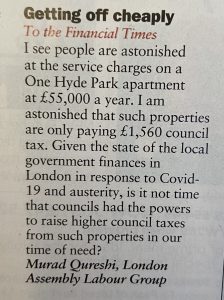
#6 -Second homes, empty homes, and holiday homes receive exemption
Second homes and empty homes are eligible for a discount of up to 50% on their Council Tax bill. The Daily Telegraph even ran an article last year titled “How to pay no Council Tax on your second home”.
#7 - Areas with the cheapest Council Tax often receive the most in public funding
Often the regions with the cheapest Council Tax receive greater public funding than others. While many areas of London are amongst the cheapest for Council Tax despite high-value housing, more has been spent on funding London’s Crossrail between 2016-2021 (£4.6 billion), than has been spent on all transport projects in all of the North of England (£4.3 billion).
For three decades, properties in London and the South East have benefitted from this unfair system. These regional imbalances must be addressed.
#8 - Council Tax bands haven’t been updated for 30 years
In that time, average property prices in London have risen from £76,000 to £490,000, while prices in the North East have only risen from £42,000 to £132,000. As a result, the top four cheapest areas for Council Tax are Westminster, Wandsworth, the City of London, and Hammersmith. The more house prices rise in a region, the more out of date Council Tax bands become.
Wales did manage to update their bands in 2005, showing it is possible to analyse valuations with political will.
#9 - It’s complicated
Over half the population (52%) said they had no understanding of how Council Tax works. The system should be easy to understand.
#10 - Less than 30% of the public think Council Tax is fair and 67% believe it should have more of a link to actual property value
Our research found that less than 30% of the British public think the tax is charged fairly across the country. Tax Justice UK also found that 67% of the public (including a majority of Conservative voters) support reforming Council Tax so it was more closely tied to the property's value.
#11 - Council Tax has come to resemble to the dreaded Poll Tax
When the Poll Tax was introduced, the average bill per individual in today’s money was around £790. If we assume two adults per household this would mean £1,580 per household. In 2020, the average band D property now pays more than that in Council Tax - £1,820
#12 - Over 110,000 households have now signed the Fairer Share petition calling on Council Tax to be replaced with a fairer system
We live in critical times: income inequality in Britain is at its worst for a decade, regional inequality is out of control, and millions of people are left using food banks just to get by. Across the UK, there are now more food banks than there are McDonald's! On top of that, with Covid-19 leading the UK into recession and more families across the country struggling to get by, there has never been a better time to reform our outdated system of Council Tax.
So far, over 110,000 households have signed the Fairer Share petition to replace Council Tax and Stamp Duty with The Proportional Property Tax, a flat rate of 0.48% on the value of property. This would reduce annual property tax bills for 18 million households - 75% of the country.
Join the growing movement of people who want a fairer deal. Add your voice and sign the petition here.
MP urges govt to abolish council tax and stamp duty
This article was first published in the FTAdviser on 01/10/2020. The original article can be read here.
A Conservative MP, who once ran a national chain of estate agents, has written to Boris Johnson urging him to abolish stamp duty and council tax.
Kevin Hollinrake, who is the MP for Thirsk and Malton, urged the prime minister to replace the present system of council tax and stamp duty with what he calls a “proportional property tax” at a flat rate of 0.48 per cent annually.
This would be split between national government and the local authority, with 0.32 percent going to the latter.
The tax would be levied on the value of a person's property each year with those owning more than one home paying the levy on each property they own.
Deferral options would be available for the elderly and asset rich but cash poor.
He said under the current framework the effective tax rate on residential property in the North East of England was 0.7 per cent, but a mere 0.2 per cent in London, despite property values being higher in the south than the north.
This is because council tax is calculated based on the value of a property decades ago, rather than its value today, so the rise in London and south eastern property prices in recent years has not been reflected.
His plan would also involve taxing land banks owned by developers at the same rate.
In Mr Hollinrake’s letter to the PM, seen by FTAdviser, he wrote: “Stamp duty acts as a simultaneous break on social mobility and [on people’s] willingness to downsize.
"Recent stamp duty announcements are welcome, but they have not addressed the fundamental inequities associated with taxing property transactions.
"Some, of course, will argue that this [proposal] is a wealth tax, in my view it is no more so than business rates, which is also a proportionate property tax."
David Hollingworth, director of communications at mortgage broker London and Country, agreed stamp duty could be a reason why some older people don’t downsize, but he added: “There are a lot of moving parts to that, people want to preserve the home they have for their children to inherit, and quite often, the supply of properties for people to move into is not great, especially as people are active for much longer.
"Also lots of people, rather than downsize, release equity from their homes and use that to help the next generation.”
Mr Hollinrake’s letter to the Prime Minister was written in conjunction with the campaign group Fairer Share, which did the policy research for the proposal.
It calculated that, if levied at 0.48 per cent of estimated property value, approximately 18m households in England would see a reduction in their tax bills.
Despite this, the proposal would be revenue neutral, it would not cost the government money, nor would it generate extra revenue.
Mr Hollinrake’s letter asks for a meeting with Mr Johnson to discuss his plans in more detail.
Written evidence: Tax after Coronavirus
In September 2020, Fairer Share submitted written evidence to the Treasury Select Committee’s important inquiry “Tax after Coronavirus”. This article details the submission and our recommendations to reform the UK’s unfair property tax system.
Introduction
- The Government’s efforts to help families and businesses across the UK in the wake of the pandemic have been commendable. Millions of households with concerns over their incomes have been supported through this period via the furlough scheme. However, it is clear that these measures cannot be in place for ever, especially as the Chancellor and the Treasury look at ways in which the public finances can be put back on to a sustainable footing in the medium term.
- As the furlough scheme and other support programmes come to an end, the Government will have to look at new ways of providing support to those affected by coronavirus while meeting its overall economic and fiscal objectives. Balancing these two issues is likely to necessitate changes to the tax system. Therefore, it is welcome that the Treasury Select Committee is using this period to reflect on some of the long-term issues (and potential opportunities) caused by the pandemic.
- Tax changes should focus on more than raising revenue. Policy makers should take a macro look at the tax system itself to ensure that it is not entrenching existing social and economic inequalities, and instead see it as a lever to support broader public policy objectives. A key part of this must be considering how tax can be used to create a fairer, more sustainable Britain, where wealth is distributed more equitably across the regions and nations. Indeed, this is at the heart of the Prime Minister’s levelling up agenda.
- In this submission we look at two areas of the tax system which are in desperate need of reform – Council Tax and Stamp Duty. In the wake of coronavirus, we propose that policy makers grasp the opportunity to remove regressive, outdated property taxes and replace them with a proportional flat rate tax on the value of the property (what we have called a Proportional Property Tax or PPT). A PPT would function as a form of wealth tax, with those who have greater property wealth paying more than those in poorer households. However, as PPT is based purely on property values, it represents a more deliverable option than other types of wealth tax that have been mooted which are based on a much broader definition of wealth.
- The introduction of PPT would have a broad array of economic and social benefits that we set out in more detail below. At its heart, replacing Council Tax and Stamp Duty with a PPT would be about creating a fundamentally fairer system; one that re-establishes the link between taxation and property price, providing a financial boost to 75% of UK households.
Key recommendations
i. Replace the Council Tax band system with a Proportional Property Tax (PPT) at a flat rate of 0.48% of property value
ii. To ensure a continuing link between local taxation and expenditure we suggest the headline PPT rate be split between a fixed national rate (going towards redistributive grants) and a floating local rate (that would be entirely spent locally and could be reduced or increased). Our initial proposal would be to have a 0.32% national rate and 0.16% local rate.
iii. There would be a higher rate of 0.96% of second, empty and non-resident owned homes
iv. Abolish Stamp Duty Land Tax (SDLT) on owner-occupied property
v. Property tax should be collected from owners, rather than tenants
vi. A deferral mechanism should be introduced for those owners unable to pay, with a modest interest charge included on the PPT – similar to the existing Deferred Payment Agreement scheme already in place to help people manage their social care costs
vii. Abolish majority of property tax reliefs and exemptions to make the system simpler
viii. Use recent improvements in technology to revalue all residential property, with annual revaluations thereafter
ix. Apply the property tax to undeveloped plots of land that have received planning permission from the local council
Key benefits
i. Put fairness back into the tax system by ensuring everyone pays the same % of tax on the value of their property. This would end the current situation where the effective tax rate on residential property is just 0.2% in London compared to 0.7% in the North East, over three times as much.
ii. Support “levelling up” and regional rebalancing by reducing bills for those outside London and the South East. A move to PPT would save Council Tax payers outside of London £6.5 billion per year, representing a huge boost to countless communities and their local economies. It would also provide further incentives for people to move out of London to benefit from lower rates as Covid has shifted the economy towards more home working.
iii. Simplify the tax system and cut the administrative burden for local authorities. 8.7 million households would be removed from property tax altogether, as the obligation to pay is transferred to the landlord. This would save tenants time and local councils £400 million in annual administrative costs.
iv. Increase the supply of housing by changing the incentives around building for residents and developers alike. In addition, PPT would make 1.4 million second homes, empty homes and undeveloped properties finally pay their fair share of tax, therefore incentivising their owners to rent, sell or develop their properties.
v. Our system is fully costed (see appendix) and revenue neutral, raising just as much from UK taxpayers as Council Tax and Stamp Duty currently do. Furthermore, PPT makes it simple for policy makers to understand how reducing or increasing the rate changes funding available centrally that is available for redistribution.
Issues with the current domestic property tax system
While property taxes are viewed as effective by economists as they are difficult to avoid, the current property tax system is failing against its policy objectives. Council Tax and Stamp Duty are entrenching regional and social inequalities and limiting overall housing supply in the market.
Council Tax
There is agreement across the political spectrum that Council Tax is a poorly-designed and highly regressive tax. Based on property values from almost thirty years ago, the IFS has said that it is “increasingly out of date and arbitrary.”[1]
It is also one of the most unpopular taxes with the general public. Polling conducted by Fairer Share in January 2020 found that just 29% of the public believe it is calculated fairly, only 26% believe their own bill is set at the right level, and only 33% are in favour of keeping the status quo.
The current Council Tax system benefits wealthy homeowners, many of whom own multiple properties, but penalises younger adults and low earners who end up paying higher effective tax rates than those in more valuable properties. There are a number of reasons for this:
Council Tax is based on property valuations that are almost thirty years out of date. It has not kept up with the huge growth in house prices, especially at the top-end of the market. It also contributes to the inequality between different regions in England. For example, the effective tax rate on residential property is just 0.2% in London compared to 0.7% in the North East.[2]
Due to the structure of the bands itself, homes at the bottom of a band pay proportionately more than those at the top of each band. There are also small differences between different bands, despite significant gaps in the value of properties.
It has well-intentioned, but distorted, exemptions for second homes and single occupants, which encourage under-occupancy and stop those who need homes most from benefitting.
Stamp Duty Land Tax (SDLT)
Unlike Council Tax, SDLT is a progressive, rather than regressive, tax. However, it has contributed to the current housing crisis by discouraging homeowners from moving. As the Centre for Policy Studies (CPS) notes, it is regarded as the “least fair tax in the country with the exemption of inheritance tax” and it is “overly complicated.”[3]
The knock-on effect from SDLT and its increasing rates is an inefficient use of existing property, as households are dissuaded from upsizing or downsizing. This has a real-world impact; it stops older people moving out of larger family homes they no longer need and inhibits a growing family from upsizing, all of which would lead to a more effective use of housing.
Combined with Council Tax, SDLT makes the current housing stock more affordable for investors and purchasers of second homes, who can pay the cost, compared to those around the country on lower salaries whose property is their primary home. It also excludes developers, incentivising them to land bank, increasing the strain and exclusivity of the market.
The government clearly understands that SDLT is a ‘bad’ tax, as seen by recent temporary increases to the starting threshold in response to the pandemic. However, this is only a stop gap measure and is due to end in March 2021. CPS’s research estimates that abolishing SDLT “would mean 25% more housing transactions,” demonstrating the cooling effect SDLT has on the market and the need for HMT to find a better long-term solution.[4]
Our solution: The Proportional Property Tax
A new property tax is needed which charges households based on their actual property wealth and ability to pay, encourages the efficient use of existing property, and is simple to understand. We propose introducing a Proportional Property Tax (PPT), which replaces the Council Tax band system, SDLT on owner-occupied property, and incentives and exemptions such as the Bedroom Tax and those for single occupants, second and empty homes. Our manifesto sets out our proposal in more detail, but we have summarised the main points below.
How it would work?
- The PPT would be set at a flat rate of 0.48% for owner-occupied property, no matter the value of the property or its location. This is the rate required to raise the same amount in revenue as the current system.
- In order to maintain the link between local expenditure and local taxation, we suggest that the rate will consist of two components. A fixed national rate which would go to central government for redistribution and a floating local ratewhich will go straight to the local authority to be spent locally. An indicative split could be 0.32% for the national rate and 0.16% for the local rate.
- The flexible rate allows councils two broad approaches; operate efficiently to reduce their costs and pass the saving on to residents or increase the local rate and invest that in the community. Lower rates get capitalised into higher property values increasing revenue and providing opportunity for further reductions. An alternate approach harnesses the link between many forms of investment (good schools and infrastructure) and rising property prices which would allow the rate to be reduced as property prices rise and see local communities benefit from much needed investment. Crucially it would be the local community’s choice on which option to adopt.
- PPT should be collected not from tenants, but directly from owners, who are in a better position to pay. This would bring England into line with international practice.
- For second, empty and non-resident owned homes, including homes of overseas owners, there should be a higher rate of 0.96%. For primary residences SDLT will be abolished but will remain in place for second homes and non-resident buyers. These receipts make a significant contribution to funding for redistribution. This property tax would also be applied to undeveloped plots of land that have received housing permission, encouraging developers to start building and increasing the supply of homes.
- A deferral system should also be introduced for those owners who can prove they are generally unable to pay; this would see the tax and a modest interest charge paid at a later date or when the home is sold. Such a system is already in place for social care, with local councils offering Deferred Payment Agreements for the cost of care, and so should be feasible to expand. This would help avoid debt issues such as bailiffs or complaints from households that they are unable to pay (an issue which is likely to increase as a result of Covid).
- For the introduction of the PPT, there will have to be a revaluation of all residential property. This should still be led by the Valuation Office Agency (VAO), though valuations should be derived from actual sales data and recent changes to house values in local areas. The Government has stated its ambition to be guided by data and technology to improve efficiency and cut costs – building an algorithm similar to those used by Zoopla and Rightmove to calculate data and provide accurate values for each home would help achieve this. Under such a system going forward, the VAO would be able to revalue properties using its algorithm each year, with properties being taxed on their average value across the last three years.
- Our system is fully costed (see appendix) and revenue neutral, raising just as much from UK taxpayers as Council Tax and Stamp Duty currently do. While many have convincingly argued for increased council budgets to pay for essential public service needs, we believe calling for an increase in taxes is beyond the scope of this paper.
What are the benefits?
Putting fairness back into the tax system
- As set out above, the flaws in the current system mean that Council Tax is only weakly linked to property values. A person living in a property worth £100,000 pays around five times more tax, as a share of property value, than someone living in a property worth £1 million.
- Not only is this fundamentally unfair, it is having a significant negative impact on the least well off in our society. This is especially the case as younger adults and lower earners are concentrated in lower Council Tax bands, and therefore pay higher effective tax rates than wealthier and older households.
- The effect of the current system is that those on lowest incomes are being presented with bills that are simply unaffordable and disproportionate to their earnings. As of March 2019 the total amount of outstanding Council Tax debt in England was £3.2 billion, an increase of over 20% in just four years. This situation will only get worse as households struggle to manage falling income as a result of Covid and local councils look to restore their finances through ever increasing Council Tax bills.
- Charging a flat rate would remove this unfairness from the system, ensuring we are taxing people fairly based on the value of their property. Overall, moving to PPT would see 18 million households paying less tax, with 75% of households better off. Additionally, PPT includes a deferral mechanism, allowing outstanding bills to be paid when the household can afford it or at the sale of the property, giving people necessary breathing space during this difficult period.
Supporting “levelling up” and regional rebalancing
- As we have seen, Council Tax under-taxes larger and more expensive properties – concentrated in London and the South East – while overtaxing cheaper homes in other parts of the country. This effect has been magnified because, since the inception of Council Tax, properties have not been revalued to keep up with property price increases – which again have been largest in London and the South East.
- The current system has led to the deeply unfair situation in which those parts of the country with greater property wealth pay relatively less in Council Tax. The effective tax rate on residential property is just 0.2% in London compared to 0.7% in the North East, over three times as much. This is manifestly regressive, penalising those who live in the regions and serving to entrench existing regional wealth inequalities.
- A move to PPT would save Council Tax payers outside of London £6.5 billion per year, representing a direct fiscal transfer to those outside of London and the South East. While this change is fair in its own terms and would help the Prime Minister to deliver his levelling up agenda, it would also be a targeted relief to help those communities most struggling to recover from the economic impacts of Covid-19.
- Reducing property taxes in the regions would also provide greater incentives for people to move out of London to benefit from lower rates. While lower rates are probably not a key driver in themselves, it would capitalise on the effect of Covid which has seen a fundamental shift in the economy towards greater home working. More people moving to the regions would benefit those communities both in the short-term from relocated workers generating greater footfall on local high streets and the longer-term through raising the quality of jobs available in these areas.
Simplifying the tax system and cutting the administrative burden for local authorities
- The current system is an administrative burden on both people and councils. In moving to PPT 8.7 million households would be removed from property tax altogether, as the obligation to pay is transferred to the landlord. Making the landlord responsible for the tax would reduce the number of rate payers (due to multiple ownership).
- In addition, every year over 750,000 English house buyers have to pay Stamp Duty or fill out forms to declare exemptions. Ending SDLT would make house buying simpler and cheaper, speeding up the overall house buying process, and helping to stimulate the housing market as it emerges from the Covid induced deep freeze.
- Taken together, these reforms would save tenants time and local councils £400 million in annual administrative costs – a vital lifeline when council budgets are already stretched beyond capacity following Covid.
Increasing the supply of housing
- Recent government data shows that over 216,000 homes have been empty for over six months, while 7.7 million homes claimed the single occupant discount in 2018.[5] One recent study by academics at UCL estimated that housing worth a total of £123 billion in Britain is rarely used.[6] Exemptions in the Council Tax system have reinforced this trend; by under-taxing larger and more expensive properties relative to other homes.
- In taxing housing transactions Stamp Duty discourages the efficient use of our existing stock of housing. This is further exacerbated because Council Tax does not apply to undeveloped sites that have already received planning permission from their local authority thereby incentivising developers to delay construction in the expectation of rising land prices, a phenomenon known as “land banking.”
- By making 1.4 million second homes, empty homes and undeveloped properties finally pay their fair share of tax, this would incentivise their owners to rent, sell or develop their properties – contributing to an increase in the overall housing supply in England.
- PPT would also change the incentives for both residents and developers to support new house building. For example, if government linked the budget for a local area to a local homes target, residents would clearly see the link between supporting development and spreading the tax burden between more property owners. Equally PPT is likely to increase demand in areas of the country where incomes are lower, by significantly reducing the cost of property tax relative to the price of property. Therefore the proposal should be seen as complimentary to the Government’s recently published planning paper, “Planning for the Future.”
What are the challenges?
- How would you value the land?
It is perfectly possible to value land separately from property for the purposes of taxing only the former. The ONS already produces estimates of land value in the UK, though these are not detailed enough for modelling the introduction of a CLL.[7] Further evidence that land valuation is perfectly feasible comes from international experience. This includes Estonia, Australia and Denmark, as well as Jamaica, Kenya, New Zealand, South Africa, and certain parts of the United States.
- Why not simply reform Council Tax bands?
By its nature, Council Tax is highly regressive in terms of property value and reforming the bands would likely have limited impact on the current situation. The IFS have argued that “revaluation alone would have little effect on the average tax bills of different household types.”[8] While HM Treasury could consider additional Council Tax bands at the top end to tax wealthier households, this would not produce a fairer system in the long run as the majority of households will still be paying Council Tax based on an outdated valuation.
- Doesn’t this mean councils outside of London and the South East will actually lose money?
No. The PPT will not decrease tax revenues for local authorities. The ‘national rate’ portion of the tax will be collected by central government and distributed to local councils accordingly to ensure their overall revenue remains the same. Given the scale of loss in local government funding as a result of Covid-19, the government is likely to have to introduce greater central funding top-ups to local government than was previously the case anyway.[9]
- How is this different to the poll tax?
The poll tax was a fixed charge on each individual, regardless of their wealth, and therefore highly regressive. PPT represents a much fairer, and administratively easy system that makes property taxes progressive.
- Is it fair that parts of London and the South East will end up paying more tax?
Properties in London and the South East have seen the greatest increase in value since Council Tax was introduced. This means that for almost three decades they have benefitted from lower Council Tax bills, enabling these households to spend more on mortgages. People buying in London and the South East will also benefit the most from the removal of SDLT, given this is already linked to property prices.
Conclusion
The coronavirus pandemic has starkly highlighted the existing inequalities that currently exist within the UK. Rightly, as we begin to recover from the crisis, policy makers are looking at how we can do so in a way which tackles the social and economic issues facing the country. The Government’s ambition to increase fairness and level up the regions is the right one. Targeted investment in skills and infrastructure is part of the way out of this crisis, but the answer also lies much closer to home for many families and individuals – the tax system.
Replacing outdated and unfair property taxes with PPT would boost the incomes of millions of people across the UK. With international inspiration of similar proposals to PPT that have been implemented successfully, and significant advancements in technology over recent years, we believe that now is the right time both politically and economically to fundamentally change the way in which the UK’s property tax system works and ensure it helps create a fairer andmore equal society.
Leading Conservative MP backs Fairer Share
This article first appeared in Conservative Home on the 23rd September.
The battle against the Coronavirus is far from over, but as we begin to look at how to achieve what the Prime Minister called “building back better”, the time is right to think about what we as Conservatives believe “better” really means.
For me that must include creating a fairer society. By hitting the most vulnerable groups hardest, Covid-19 has sharply exposed the profound inequalities that exist in Britain. These are divides that a modern Conservative Party must be committed to eradicating. Now is the moment to do so, and as a fundamental part of that we have to look at how we tax people.
While it might not be the first thing that comes to mind, replacing council tax and stamp duty should be part of the roadmap for a fairer Britain. It’s a fundamental principle of taxation that taxes should be simple, transparent and fair, yet these taxes achieve none of those things.
Council tax is based on property values that are thirty years out of date, taxes low-value homes at a much higher rate than high-value properties and pushes millions of households into debt. It is emblematic of a broken system that is no longer fit for purpose.
Ultimately these taxes are unfair, complicated and block aspiration. Unfair because the poorest find themselves hit hardest. Complicated because they are difficult to understand and command an intricate web of bureaucracy to administer. And they hinder aspiration by taxing property transactions and discouraging people from moving home.
Since being elected to Thirsk and Malton in 2015, and as Chair of the APPG on poverty, I have seen first-hand how council tax inflicts immense suffering on some of our most vulnerable citizens while failing to fulfil the most basic tasks of a functioning property tax.
It has a devastating impact on low-income households, who if they are unable to pay are aggressively pursued by local authorities and debt collection authorities – and in some cases even imprisoned. According to Citizens Advice, 40 per cent of problem debt can be apportioned to council tax, up from 21 per cent in 2011. The Covid-19 crisis has only exacerbated the situation, with an extra £700 million in council tax debt accrued by 800,000 struggling UK households since March.
As an officer of the APPG on Land Value Capture and a former member of Parliament’s Housing, Communities and Local Government (HCLG) Select Committee, I’ve become depressingly familiar with council tax’s many structural flaws. Chief among these is its failure to keep up with the substantial increases in property values that have taken place in recent decades, particularly in London and the South East.
This has deprived the Treasury of crucial tax revenues. While it is right that property owners are able to enjoy the fruits of their investment, it is only fair that in return they are taxed on the actual – rather than 1991 – valuations of their homes.
I have come to accept that council tax is in need of replacement – the problems will not be solved simply by adding one or two more property bands. I was therefore delighted to discover that a new grassroots campaign, Fairer Share, has put forward credible and costed proposals to do just that. It proposes replacing council tax and stamp duty with a proportional property tax (PPT) which would tax all homes at exactly the same rate based on up-to-date property values.
These proposals have two key merits in comparison to council tax: they are fairer and they are simpler. By taxing homeowners on current property values, they would ensure that wealthy homeowners pay an amount of tax that actually reflects the value of their homes while providing a much-needed tax cut to millions of low- and middle-income households.
This would give a real boost to the UK’s regions, the majority of which are hugely disadvantaged by the current system. This is in stark contrast to the status quo, under which a person living in a property worth £100,000 pays around five times more tax as a share of property value than someone living in a property worth £1 million – the equivalent of charging more VAT on a Ford than on a Ferrari.
In place of the administrative challenge of council tax, in which properties are taxed through a confusing and distorting system of bands and exemptions, the PPT would apply a single rate of tax – 0.48 per cent of property value – to all homes. Owners rather than tenants would be responsible for the tax, removing over 8.7 million households from property tax altogether and saving councils an annual £400 million in administrative costs.
To incentivise more efficient usage of existing property, a surcharge on second, empty and offshore-owned homes would be introduced, as well as on plots of land that received council planning permission yet have been left vacant by developers. The policy is revenue neutral – raising the same amount of money for the Treasury as the scrapped taxes currently do.
To maintain the important democratic link between local expenditure and local taxation, Fairer Share recommends that the 0.48 per cent rate should consist of two components. A fixed national rate (0.32 per cent) which would go to central government for redistribution and an initial floating local rate (0.16 per cent) which would go straight to the local authority and could subsequently be moved up or down by that authority. In this way local authorities retain flexibility over taxation and voters can still judge them on value for money.
And importantly, this approach includes the complete abolition of stamp duty land tax (SDLT) on owner-occupied residential property. By taxing properties when they change hands, stamp duty discourages homeowners from moving – such as a young household looking to buy a family home or an older couple looking to downsize – and prevents the efficient use of our existing supply of housing. This also has wider economic consequences when, for example, it leads to people turning down job opportunities outside of their area due to the cost of moving home.
The Government has already acknowledged the harm stamp duty causes by introducing numerous exemptions from the tax, including most recently a temporary holiday on all purchases up to £500,000 announced last month. With the UK likely facing an extended economic downturn, the Chancellor should now take further action to support the housing market by fully abolishing stamp duty on owner-occupied property.
While replacing taxes as fundamental as council tax and stamp duty – responsible for raising £50 billion annually - is no walk in the park, I firmly believe it is the right thing to do. The current system of council tax and stamp duty is simply unfair and inefficient.
Local authority finances have been hit hard recently. Replacing these taxes with a better system will put them on a stronger foundation for the future. The PPT is simpler and easier to operate, and revaluations can be carried out regularly, quickly and easily using the latest technology and on a desktop basis.
The Fairer Share campaign has provided us with an excellent blueprint for reform. I urge the Chancellor to take its proposals seriously, starting by announcing a fundamental review of council tax at this year’s Autumn Budget. This would mirror the Treasury’s ongoing review of business rates, the other half of our dysfunctional property tax system.
While it would take time to get the details right, introducing a proportional tax on property in the UK would be an excellent way for our party to demonstrate our commitment to “levelling up” and to do something meaningful for the many new constituencies we have won across the country.
I urge anyone interested in Fairer Share’s proposals to visit their website here or get in touch with me, and to share this article and the wider campaign with their networks. I will also be hosting a live webinar and Q&A with the Fairer Share team in the coming weeks – details will be posted on my website in due course.
Kevin Hollinrake is MP for Thirsk and Malton.




